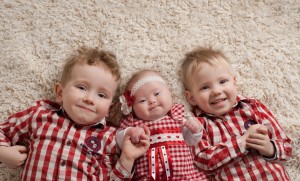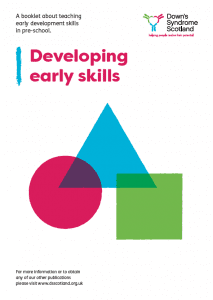Development
With any new baby, thinking about how they are going to develop is most probably one of the top questions. Like all babies, little ones with Down’s syndrome need a lot of care and attention. New parents often worry if they need to treat their baby differently if they have with Down’s syndrome. Unless they have a significant health concern, then there would be no reason why they cannot be treated the same. Babies with Down’s syndrome need an environment that is rich in learning activities with lots of opportunities to interact with and explore their environment. The range of skills they can develop with your guidance and encouragement will be far greater than what can they could achieve on their own.
Spend time playing and enjoying time with your baby through talking, singing, cuddling, and massage. The insert for your little red book gives you some ideas of when milestones may be reached but remember every child is unique.
Holding and Moving at Birth
Most children with Down’s syndrome are born with low muscle tone, known as hypotonia which can make them floppy and it may take them longer to gain head control, roll over, sit up and use their hands to grasp objects, however, each child will be affected differently, some children are affected very mildly, whereas in others it can be far more noticeable.
This is nothing to be overly concerned about and should not stop you cuddling your baby. Just take extra care to support their head and posture. If you have any concerns speak to your Health Visitor in the first instance and our Family Support team are here to support you with information and guidance with any aspect of your child’s health and development you may need.
The questions below from the postcards in your new parent pack are designed to help you recognise any concerns with your babies development or health needs, or when you and your baby may need extra specialist support.
- Although your baby may develop more slowly than typically developing babies, muscle tone will usually improve and they should still master the basic gross motor skills of rolling, sitting, Are you confident handling your child?
- Is your child active on a playmat and moving all 4 limbs?
- Is your child happy lying on his/her tummy?
If you have any concerns about your baby’s floppiness or movement or answer “no” to any of the questions above, then please ask your Health Visitor to contact your paediatric physiotherapy department to make a request for support. The physiotherapist can help with your child’s development of posture and movement, give you advice on handling and positioning your baby and support with any difficulties in achieving any stage of their motor development.
Children with Down’s syndrome tend to have an uneven learning profile and developmental milestones may be reached later, and, sometimes, children may appear to slow down in one area whilst making progress in another. The specific learning styles and individual needs of each child are unique and should always be considered when planning new learning activities.
Our Developing Early Skills booklet gives you more information about the development and learning profile of children with Down’s syndrome and has lots of ideas for supporting their early development. You can download this here.
From 3 months onwards, you can apply for Disability Living Allowance (DLA) from the Department of Work and Pensions (DWP). This is help with the additional costs that you may have in bringing up your child with Down’s syndrome. In our experience, unless your baby has a significant health need, you are best to apply when your baby is around 9 months – 1 year old. You can find out more about DLA here.
If you would like to talk about your baby’s development our Family Support Team are here to help with support and information, and link to other professionals where appropriate. The team can also help if you have any questions about financial support and help with further information or applying for welfare benefits.





